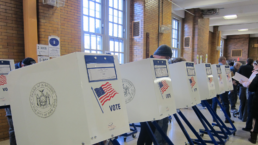From abortion rights to minimum wage hikes to legal marijuana, voters’ support for ballot issues didn’t correlate with their support for candidates.
By Glenn Daigon, The Progressive
Earlier this month, a twenty-year-old University of Wisconsin–Madison student named Mike Islami told NPR he believes abortion is “a women’s right,” and that the issue was “definitely in the back of my mind” when he cast his ballot.
Islami voted for Donald Trump, whose Supreme Court appointments overturned Roe v. Wade.
These types of mixed political signals were not a fluke this November. While the electorate largely voted in favor of progressive economic and social initiatives placed on state ballots earlier this month, they simultaneously voted for candidates who stood steadfastly against those very policies.

This year, Democratic voters approved a range of ballot initiatives in support of abortion rights, a $15 an hour minimum wage, and paid leave The Democratic Party spent hundreds of millions of dollars on a reproductive rights campaign in an attempt to capitalize on support for abortion rights, and supported ten state ballot initiatives before voters in states including Montana, Nevada, Arizona, Colorado, Missouri, and Maryland, passing in them all. In Florida, some Democrats hoped that a constitutional amendment guaranteeing the right to abortion up to the point of viability would help boost their voter turnout and flip the state blue. The amendment garnered a solid 57 percent majority (a higher percentage than Trump garnered), but fell short of the 60 percent needed for a constitutional amendment—a requirement enacted in 2006 with the help of Florida Republicans and business interests. Ballot measures to protect abortion rights also failed in South Dakota and Nebraska.
Why didn’t this effort pay off? What seems to have happened is that voters compartmentalized their support for popular ballot issues and their support for candidates running for office.
“When voters go to the booths, they don’t see a ‘D’ or an ‘R’ next to a ballot measure,” Chris Melody Fields Figueredo, director of the Ballot Initiative Strategy Center, a nonprofit dedicated to advancing progressive economic and social ballot initiatives, tells The Progressive. “They really just see the opportunity to take power and agency into their own hands and raise the minimum wage in their state, or offer paid sick leave.”
Recent Posts
New Addition to List of Nuclear Near Catastrophes
February 25, 2026
Take Action Now Debris flew for great distances — many times the distance of 270 meters to a nuclear reactor and nuclear storage facility.By David…
Gavin Newsom’s last budget belies his ‘California for All’ pledge
February 24, 2026
Take Action Now Yet, even as the state is poised to lose billions in federal funding, and millions of Californians are losing access to health care…
Israel and American Hawks are Pushing U.S. to Iran War With Catastrophic Consequences
February 23, 2026
Take Action Now At the World Health Assembly in May, member states may endorse an unprecedented strategy declaring that health is not a cost – but…
A Child’s View of the Attack on Venezuela. And a Peace Flotilla
February 23, 2026
Take Action Now Fabricio said that he and his family went out of their building and saw many people also going outside, running around, and kids…




